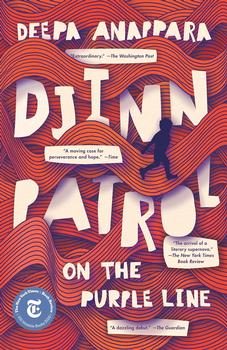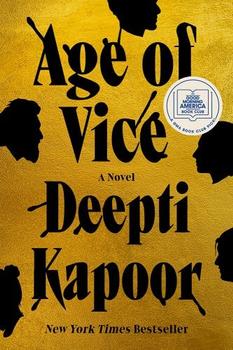Summary | Excerpt | Reviews | Beyond the book | Read-Alikes | Genres & Themes | Author Bio

In an unnamed slum somewhere in sprawling India, children are being plucked off the streets, never to be seen again. Jai, a devil-may-care nine-year-old obsessed with TV cop shows, decides to turn detective and begins investigating the disappearances of his schoolmates and neighbors with help from his two best friends—wise-beyond-her-years Pari and feisty Faiz. Together, these young sleuths try to deduce whether they are dealing with a sadistic kidnapper or something altogether more elusive, evil soul-snatching spirits known as djinn.
The trio fast realize they are facing their unknown adversary alone. The police see the slum as a continual source of annoyance and threaten to bulldoze it to the ground. The wealthy people who live in a gated community of nearby high-rises couldn't care less. And with hysteria creeping in, the adults in the slum begin to turn on each other, causing a rift between the Hindu and Muslim factions within the settlement. With no help or resources, can Jai, Pari and Faiz solve this horrific mystery?
Author Deepa Anappara has taken inspiration for her impressive debut from over a decade of working as a journalist reporting on the impact of poverty and religious violence on children in India. At a moment when there is much heated debate about the legitimacy of which authors get to tell which stories, Djinn Patrol on the Purple Line makes a compelling case that nothing can beat a genuine voice drawing from profound first-hand experience.
Anappara's India lives and breathes on the page. Every tin-roofed hut, abandoned alleyway, and overcrowded bazaar fizzes with a richness of detail that could only be rooted in the author's intimate knowledge of her setting. (That's not to downplay her perceptive eye and flair for description, naturally.) Speech is also seasoned with authentic colloquialisms—Jai's favored sign-off of "okay-tata-bye" never fails to raise a smile—and a smattering of Hindi and Urdu patois: arrey (a catch-all term used to express a range of emotions), basti (a slum settlement), as well as familial terms such as didi (elder sister), chachi (aunty) and abbu (father). A glossary is provided at the back for easy reference.
The wealth of description can be a tad distracting at times. Anappara infuses nearly every page with a blaring medley of sights, smells and sounds. It's an assault on the senses that threatens to derail the plot on occasion; like trying to make a beeline through a bazaar and getting drawn to the myriad stalls mounted with colorful spices and shiny trinkets every step of the way. It's fascinating for a while, but there comes a point where you just wish to proceed with blinkers on.
There are also a few tonal inconsistencies. The magical realist touches of djinns and guardian spirits who protect kids in danger lovingly introduced at the start are quickly abandoned, lending the novel a more grounded quality. It's a shame that the supernatural elements weren't explored further. Not only are they a joy to read, but they heighten the ambiguity of the kidnapper, making for a more intriguing mystery.
Minor grievances aside, Djinn Patrol on the Purple Line is best when it's mining India's dark underbelly, shining a light on the harsh realities slum children face on a daily basis. The country's outright contempt towards its poorer communities. The homeless pickpockets on the streets. The young slaving away at grueling jobs to bring home a few extra rupees for their struggling families. The constant threat of human traffickers attempting to lure kids away with sweets and acts of kindness.
Anappara also delves into the misogyny and racism that still plague much of India. When 16-year-old Aanchal disappears, the men and women of the basti don't offer her the same compassion as they do the prepubescent abductees. Instead, she is blamed for her own disappearance and labeled randi (whore), based on nothing but gossip and ill-informed rumors. "Her boyfriend is as old as her grandfather...But worse, he's Muslim," one woman comments. "Who knows how many boyfriends a girl like that has?" says another.
We face this maelstrom of malevolence through Jai's cheeky, endearing gaze, which makes it all the more harrowing. His exuberance for life is juxtaposed with a world that is hell-bent on stamping out his innocence at every turn.
When the mystery of the disappearing children is finally unraveled, it's a punch to the solar plexus. It's bleak, maddening, unjust. It's a culmination that perhaps doesn't make for the most satisfying conclusion to a novel. However, Anappara earns her right to eschew any happy endings. In an India where as many as 180 children go missing every day, with the vast majority of cases remaining unsolved, the enthralling Djinn Patrol on the Purple Line is unafraid to lay bare the country's grim realities and entreats us to stop turning a blind eye.
![]() This review was originally published in The BookBrowse Review in March 2020, and has been updated for the
June 2021 edition.
Click here to go to this issue.
This review was originally published in The BookBrowse Review in March 2020, and has been updated for the
June 2021 edition.
Click here to go to this issue.

If you liked Djinn Patrol on the Purple Line, try these:

The Djinn Waits a Hundred Years
by Shubnum Khan
Published 2025
"A dark and heady dream of a book" (Alix E. Harrow) about a ruined mansion by the sea, the djinn that haunts it, and a curious girl who unearths the tragedy that happened there a hundred years previous

by Deepti Kapoor
Published 2024
This is the age of vice, where money, pleasure, and power are everything, and the family ties that bind can also kill.
They say that in the end truth will triumph, but it's a lie.
Click Here to find out who said this, as well as discovering other famous literary quotes!
Your guide toexceptional books
BookBrowse seeks out and recommends the best in contemporary fiction and nonfiction—books that not only engage and entertain but also deepen our understanding of ourselves and the world around us.